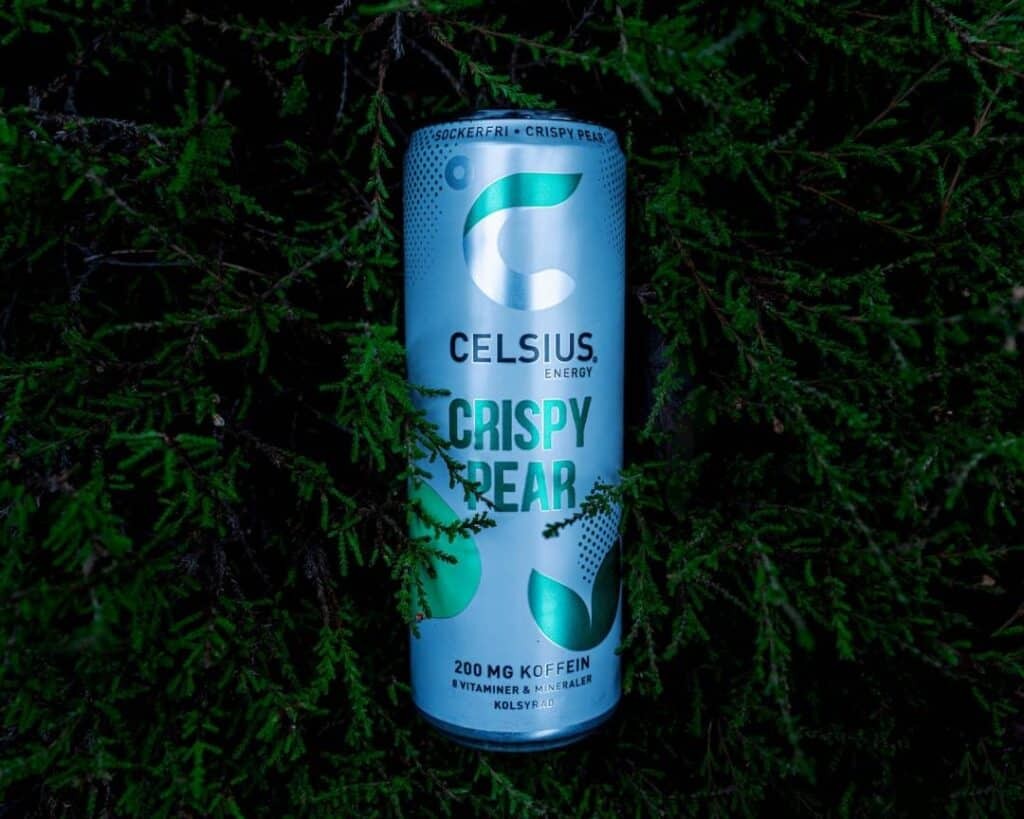Why Is Celsius Bad For You? This question is increasingly common, and at WHY.EDU.VN, we provide a detailed analysis. This article explores the potential downsides of Celsius energy drinks, examining ingredients, caffeine content, and scientific evidence to give you clear insights. Discover if Celsius fits into a healthy lifestyle, understanding both its benefits and risks, and learn more about energy drinks and potential health impacts.
1. Understanding Celsius Energy Drink: What’s Inside?
Celsius energy drink is a popular beverage marketed for its energy-boosting and metabolism-accelerating properties. It contains a blend of ingredients that are claimed to provide various health benefits. Let’s break down the key components of Celsius to understand what they do and how they might affect you.
- Green Tea Extract: Known for its caffeine content and epigallocatechin gallate (EGCG), an antioxidant. EGCG helps cells stay healthy, offering a mood and energy boost.
- Guarana Seed Extract: A plant from the Amazon rainforest that, similar to coffee, contains caffeine and other active compounds. Its caffeine content is well-researched, but the safety and efficacy of other compounds are still being studied.
- Ginger Root: Offers anti-inflammatory benefits in the right amounts. It’s not just for flavor but also provides potential health advantages.
- B-Vitamins: These vitamins work together to help release energy from food. While they don’t directly provide energy, they are crucial in converting carbs, fats, and proteins into usable energy.
- Caffeine: Celsius products typically contain 200mg of caffeine per 8.4-ounce can. Some products offer caffeine content ranging from 100-300 mg per serving.
Understanding these ingredients is essential to determining whether Celsius fits into a healthy lifestyle.
2. How Much Caffeine Is Too Much in Celsius?
The caffeine content in Celsius energy drinks varies across their product line. The original Celsius contains 200 milligrams of caffeine per 8.4-ounce can. Other variations range from 100 to 300 mg per serving.
| Product | Caffeine Content (mg) | Serving Size (oz) |
|---|---|---|
| Original Celsius | 200 | 8.4 |
| Celsius Heat | 300 | 12 |
| Celsius BCAA+Energy | 100 | 12 |


To put this into perspective, a typical 8-ounce cup of coffee contains about 95 milligrams of caffeine, while an 8.4-ounce can of Red Bull has 80 milligrams.
However, coffee servings often exceed 8 ounces. A grande cup of coffee from Starbucks contains 310 mg of caffeine. Consuming other caffeine sources (coffee, tea, soda) with Celsius can lead to side effects like shakiness, headaches, and anxiety.
The Food and Drug Administration (FDA) suggests a safe daily caffeine intake of up to 400 mg for healthy adults. Exceeding this limit can lead to adverse effects.
3. Evaluating the Claims: Is Celsius Good for You?
Celsius claims to provide “essential energy, accelerates metabolism, and burns body fat.” These claims are exciting, but it’s important to evaluate them critically.
Celsius does have some peer-reviewed research to support its claims. A 2010 study found that men who exercised and drank Celsius showed greater improvement in physical fitness compared to those who didn’t consume Celsius.
However, remember that metabolism is influenced by many factors, not just energy drinks. Also, any caffeine intake before exercise can improve performance and increase pain tolerance. A cup of coffee could offer similar benefits at a lower cost and with fewer additives.
When evaluating studies sponsored by companies, keep in mind the research might be small. A single drink isn’t a magic bullet for health. Your overall diet, exercise, stress management, and sleep habits all play crucial roles.
4. Potential Risks: Are Celsius Drinks Bad for You?
For healthy adults, moderate Celsius consumption is likely safe. However, it’s important to acknowledge that Celsius drinks contain a high amount of caffeine. The product label advises against exceeding two servings per day and is not recommended for caffeine-sensitive individuals, children under 18, or pregnant or nursing women.
If you have any health conditions, especially heart conditions, consult your doctor before consuming Celsius. While marketed as sports drinks, the benefits may not always outweigh the risks. Marketers are focused on selling products, not providing health advice.
The main concern with Celsius and similar energy drinks is the potential for adverse effects from high caffeine intake.
Potential Side Effects of Excessive Caffeine Consumption:
- Anxiety
- Insomnia
- Rapid heart rate
- Digestive issues
- High blood pressure
Consumers should consider potential ingredients and caffeine levels when deciding whether to incorporate Celsius into their routines.
5. Understanding Proprietary Blends in Celsius
Celsius energy drinks contain “proprietary blends,” meaning the exact amount of each ingredient remains undisclosed. This lack of transparency makes it difficult to assess the drink’s safety and effectiveness.
While ingredients like ginger are present, we can’t determine if the dosage is sufficient to produce meaningful anti-inflammatory effects. Without knowing the precise amounts, it’s challenging to verify whether Celsius delivers the promised benefits.
6. Financial Implications: The Cost of a Celsius Habit
A 12-pack of Celsius costs nearly $24, which is about $2 per can when purchased in bulk. A single can can cost around $2.50.
Daily consumption can quickly add up. Drinking one can per day would cost over $700 per year, even when buying in bulk.
Consider more cost-effective ways to support your health and wellness. A balanced diet, regular exercise, and sufficient sleep are more economical and beneficial options.
7. The Celsius Lawsuit: Addressing Misleading Claims
Celsius settled a class-action lawsuit related to its “preservative-free” labeling. Despite marketing the drinks as preservative-free, they contain citric acid, which acts as a preservative.
Celsius argued that the citric acid was added for flavoring, not as a preservative. However, citric acid does have preservative properties regardless of its intended purpose.
Although Celsius has updated its labeling to reflect that citric acid is used for flavoring, the lawsuit highlights the importance of scrutinizing marketing claims.
8. Debunking Magic Bullets: A Realistic Perspective
When it comes to health, eating, and weight management, there are no quick fixes. Marketers often promote products as the missing piece in your wellness journey, but health is the result of consistent habits.
Health and wellness allow flexibility. You can enjoy your favorite foods without deprivation.
If you enjoy Celsius, the caffeine boost, and it fits your budget, consume it in moderation. If you prefer coffee or don’t want to spend a significant portion of your budget on Celsius, skip it. It’s not essential for improving metabolism or workouts.
9. Key Takeaways: A Balanced Approach to Celsius
Celsius beverages are not magical solutions for weight loss or metabolism-boosting. Drinking Celsius alongside exercise may slightly increase metabolism, but it’s not necessary for achieving fitness goals.
If you choose to drink Celsius, enjoy it while maintaining realistic expectations and monitoring your overall caffeine intake.
Ultimately, any benefits from Celsius depend on integrating it into a healthy nutrition and fitness plan.
10. Frequently Asked Questions (FAQs) About Celsius
Here are some frequently asked questions about Celsius energy drinks to provide further clarification:
| Question | Answer |
|---|---|
| What exactly is Celsius? | Celsius is an energy drink that contains green tea extract, guarana, ginger, vitamins, and caffeine, marketed to boost metabolism and energy. |
| How much caffeine is in one can of Celsius? | It varies by product, but the original Celsius contains 200 mg of caffeine per 8.4-ounce can. |
| Is it safe to drink Celsius every day? | Healthy adults can likely consume it in moderation. However, it’s important to monitor caffeine intake and avoid exceeding recommended daily limits. |
| Can Celsius help with weight loss? | Celsius might boost metabolism slightly, especially when combined with exercise, but it’s not a guaranteed weight-loss solution. A healthy diet and regular physical activity are crucial. |
| Are there any side effects of drinking Celsius? | Potential side effects include anxiety, insomnia, rapid heart rate, digestive issues, and high blood pressure, primarily due to the caffeine content. |
| Who should avoid drinking Celsius? | Children, pregnant or nursing women, and individuals sensitive to caffeine or with heart conditions should avoid Celsius. |
| What are the ingredients in Celsius? | The main ingredients include green tea extract, guarana seed extract, ginger root, B-vitamins, vitamin C, and caffeine. |
| Does Celsius contain sugar? | No, Celsius contains no added sugar but uses artificial sweeteners like sucralose. |
| What does “proprietary blend” mean in Celsius? | It means the exact amounts of each ingredient in the blend are not disclosed, making it difficult to assess the effectiveness and safety of the drink. |
| Is Celsius a good pre-workout drink? | It can be due to the caffeine content, but it’s essential to consider the potential side effects and whether it’s worth the cost compared to other options like coffee. |
Conclusion: Making Informed Choices About Celsius
In conclusion, whether Celsius is “bad” for you depends on various factors, including your health status, caffeine sensitivity, and consumption habits. While it may offer some benefits such as increased energy and a slight metabolism boost, it’s crucial to be aware of the potential risks associated with high caffeine intake.
At WHY.EDU.VN, we aim to provide clear, reliable information to help you make informed decisions about your health. Remember, a balanced lifestyle that includes a healthy diet, regular exercise, and sufficient rest is key to achieving your wellness goals.
Do you have more questions or need personalized advice? Visit WHY.EDU.VN at 101 Curiosity Lane, Answer Town, CA 90210, United States, or contact us via WhatsApp at +1 (213) 555-0101. Our experts are here to provide the answers you need. Navigate the complexities of health and wellness with confidence, thanks to the expertise available at why.edu.vn.